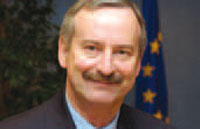
The new European Commission Vice-President for Transport is Estonian Siim Kallas. Mr Kallas was previously the Commissioner of Administration, Audit and Anti-Fraud in the last Commission.
The newly designated Commissioners have been appointed and confirmed by the European Parliament as of mid-February.
Most importantly for airports, the new European Commission Vice-President in charge of Transport is Estonian Siim Kallas. Mr Kallas was previously the European Commission Vice-President in charge of Administration, Audit and Anti-Fraud in the last Commission.
However, with this change, there is also a revision of the Transport portfolio. The Galileo satellite navigation project will move to DG Industry and Entrepreneurship, to which former Transport Commissioner Antonio Tajani has been appointed. Significantly, the responsibility for state aid policy will move to the DG Competition, to which Commissioner Joaquin Almunia of Spain has been appointed. Because of these changes and in particular the separation of the Transport and Energy portfolios, DG TREN has been renamed DG MOVE.
With the ‘Greening of the EU Economy’ still a major priority for European Commission President Barroso, now in his second term, the relevant portfolios complementing that are also expected to enjoy increased profile in the years ahead. Taking on the role of Environment Commissioner is Janez Potocnik of Slovenia, who was Commissioner for Science & Research in the last Commission, while the newly created post of Climate Action Commissioner has gone to Denmark’s Connie Hedegaard. Following on from what many see as a disappointing result from the United Nations Climate Change negotiations in Copenhagen in December (COP15), the creation of this new position will potentially make the decision-making process in the area of transport and climate change more complicated to follow.
The work programme currently includes the proposed EU Directive for Aviation Security Charges, the forthcoming revision of the existing EU Regulation on Airport Slots, new TEN-T guidelines (Trans-European Transport Network) and a possible review of the existing EU Directive on Ground handling, as well as the EU Regulation on Passengers with Reduced-Mobility (PRMs). However, the most significant work currently under way is the White Paper on the Future of Transport Policy in the EU, which is an all-encompassing policy review affecting all transport modes.
Speaking to Airport Business, the present Director General of DG MOVE, Matthias Ruete, said “A high priority for DG MOVE is to contribute to the strengthening of transport and logistics industries in Europe. We need a smart and sustainable strategy to overcome the economic crisis, building on Europe’s strengths in logistics. Airports as important nodes will be one major focus of our future mobility and transport policies.”
Spanish Presidency of the EU

Speaking to Airport Business, the present Director General of DG MOVE, Matthias Ruete, said “A high priority for DG MOVE is to contribute to the strengthening of transport and logistics industries in Europe. We need a smart and sustainable strategy to overcome the economic crisis, building on Europe’s strengths in logistics. Airports as important nodes will be one major focus of our future mobility and transport policies.”
The six-month rotating Presidency of the EU by Member States continues, with Spain at the helm for the first half of 2010, to be followed by Belgium in the second half.
In terms of the priorities of the Presidency, for aviation and airports, there is ongoing support for the implementation of the Single European Sky II (SES II package) and on the matter of LAGs, the Spanish Presidency shares the concerns of ACI EUROPE regarding operational efficiency and readiness.
The Presidency, in collaboration with the European Commission, is hosting two aviation events:
- High Level Conference on the Implementation of Single European Sky II (SES II) which took place in Madrid on 25-26 February. This event resulted in a detailed roadmap aimed at accelerating the key elements of the SES II package. Olivier Jankovec, Director General, ACI EUROPE, spoke at the event, making a presentation focused on the need for airports to become more integrated in the ATM network and on the looming airport capacity crunch that Europe is facing in the next 20 years.
- An EU & Latin America Aviation Summit is also planned to take place in Rio de Janeiro on 24-25 May.
The Spanish Presidency has also given its official support to the ACI EUROPE SMAG Regional Airports Conference taking place in Dubrovnik on 15-17 March 2010.







